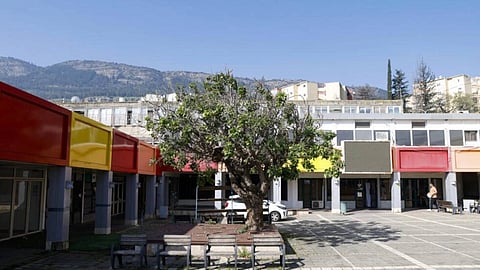

Kiryat Shmona, Israel: Kiryat Shmona, in the hills of Israel's far north, is virtually empty, with few shops open and mostly military traffic on the roads to and from bases up the valley near the Lebanese border.
On the streets, cats seem to outnumber pedestrians but down a deserted lane a handful of call centre workers at a telecoms firm are gathered at the open windows of their office kitchen.
Coffees and mobile telephones in hand, they peer out, as if looking for signs of life.
"I've never seen Kiryat Shmona like this," said Hosam Willie, a technical support team leader at the firm. "It's like a ghost town," he told AFP.
"It reminds me of Covid times. But at least then you saw people walking outside or on their balconies. Now there's nobody."
Since Hamas's deadly attack on southern Israel on October 7, the country's focus has firmly been on its war with the Palestinian militants in the Gaza Strip.
The Hamas attack resulted in the deaths of about 1,160 people in Israel, mostly civilians, according to an AFP tally based on official Israeli figures.
At least 29,514 people, mostly women and children, have been killed in Israel's retaliatory military offensive on Gaza, aimed at destroying Hamas, according to the health ministry in the Hamas-run territory.
But more than 200 kilometres (130 miles) to the north, the Israeli military is steadily preparing itself in case of war with Hamas's Iran-backed ally Hezbollah in Lebanon.
Cross-border rocket attacks and retaliatory air strikes have become an almost daily occurrence for more than four months.
Six civilians have been killed on the Israeli side of the border, according to the military. In Lebanon, 44 civilians have been killed, according to an AFP tally.
The deadly exchanges have prompted most people in communities on both sides of the heavily fortified border to leave.
For Willie and his colleagues, the fear of a second front opening in the north meant working from home for two months -- until they were given the option to come back to the office in December.
Some have decided to stay away, doing their jobs from behind a computer in Tiberias, down the valley on the western shore of the Sea of Galilee, or in Jerusalem, Tel Aviv and even as far away as Eilat in the far south.
Uncertainty
Willie decided to come in to the office, and makes his way past military checkpoints from his village in the Israeli-occupied Golan Heights away to the east, to break the monotony and isolation of remote-working.
Yet even though there is work to do, assisting customers with troublesome internet connections or phone issues, the threat of war weighs heavily on everyone's minds.
"We don't know if they will go to war. Nobody knows... The waiting is really hard," said Willie, a father of two young boys.
"It's constantly on our minds," agreed Miliah Hasbani, a 27-year-old call centre technician who has been making the 100-kilometre round trip from Tiberias to Kiryat Shmona for the past four months.
"At least when I'm here in the office it's more normal."
For the employees, the decision to stay in the area is often a practical one such as responsibilities towards elderly parents and wider family.
Others say they simply do not want to be stuck in a hotel room with their families elsewhere in the country while the uncertainty persists.
"It's a much better atmosphere at work," said Hasbani. "We need to see people."
On Thursday, Kiryat Shmona was hit again by several rockets fired from Lebanon, the Israeli army said.
No injuries were reported but it was an explosive reminder of the threat from across the hills, despite the deceptive calm.
At the office, the hope is that the threat will pass, the uncertainty will lift and life will return to normal.
"The only good thing is the parking is free at the moment," said Willie. "We can park wherever we want."